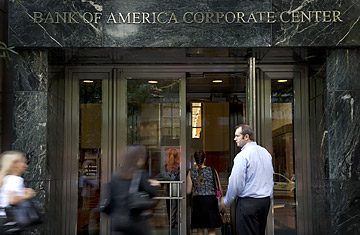
Employees enter the Bank of America headquarters in Charlotte, North Carolina.
The South, long synonymous with hyper economic growth, is going through a harrowing recession. Currently, 8 of the 15 states with the highest unemployment rates are in the South: North and South Carolina, Georgia and Florida are all reporting the highest rate in their state's history. South Carolina posted the nation's third-highest unemployment rate for March — 11.4%, after Michigan and Oregon. (Read "When Joblessness Becomes Homelessness.")
The downturn's effects are visible everywhere: Harrah's recently halted construction of a $700 million casino project on Mississippi's Gulf Coast, leaving barely a set of pillars, and threatening the recovery of an area battered by a series of hurricanes earlier this decade. Meanwhile, bankers in Charlotte, N.C., are awaiting their walking papers: No one knows how many of Wachovia's roughly 20,000 employees there will be cut in the company's merger with Wells-Fargo. Or how many of Bank of America's 15,000 Charlotte employees will survive the company's plans to shed some 35,000 jobs nationally in the coming years. "There's a whole lot of uncertainty, especially around Wells," says Bob Morgan, president of the Charlotte Chamber of Commerce.
The auto industry woes are being felt here too. Over the last two decades, Mississippi, South Carolina and Tennessee lured automakers with relatively inexpensive land and lax labor laws. Now, Tennessee is fighting the possible closure of a GM plant in Spring Hill, and Toyota has already postponed the start of production of the Prius at a new plant in Mississippi.
If there's any city that symbolizes the boldness of the South's economic ascendance, and what's at stake with its decline, it is Atlanta. New condominium projects are scattered across this city's downtown. One of the most striking is the Atlantic Residences, up the street from a faux Arc de Triomphe, a man-made pond, an Ikea and a Target. A sign around the 46-story tower reads: "Luxury residences from the $400s to $800s" ... Spectacular penthouse from $1 million." Just a few months before the building's planned opening, however, the appetite for such excess is disappearing. (See 50 authentic American travel experiences.)
Demand for more moderately priced homes is weak as well. Rajeev Dhawan, director of the Economic Forecasting Center at Georgia State University in Atlanta, estimates that each year between 2002 and 2006, some 68,000 permits for new homes were issued here, even as only 30,000 jobs were being added annually. "Now," Dhawan says, "it's catching up." The shrinking corps of real estate agents here are taking desperate measures, like offering two-bedroom condos for the price of a one-bedroom unit.
This city came to view the breadth of its industrial base as a shield from economic downturns. But no sector is immune to this recession, not even Atlanta's core tourism industry. Occupancy at Atlanta-area hotels is down 16.4%, and some are barely half-full, partly because corporate travel has declined.
Atlanta's growth bolstered the aspirations of cities and towns across this region. But the recession is delivering a dose of sobriety, and stoking fears in places like Allendale County, S.C., 200 miles away. Allendale County's unemployment rate stands at 23.4%. Ronnie Jackson, the mayor of the town of Allendale, population barely 3,700, says the town's decline started in the 1970s, when the old Route 301 was replaced by I-95 as the main connector to Florida. The town lost motels and restaurants, says Jackson, the mayor since last November. But the more recent closure of a nearby carpet factory, with the loss of some 200 jobs, deepened the problems in the town and the entire county.
Folks in Allendale don't have extra money to spend. So the town's already meager tax base is eroding. If any of Allendale's 38 employees leaves, there will be no replacement. Jackson's dreams of a new police station are dashed. Now, he fears many of the remaining residents will leave. The other day, he showed up in town with two employment applications to cut grass at a nearby nuclear power plant. "Loads of people came up to me grabbing applications," Jackson says. Still, he's hopeful some of the federal government's stimulus money will help Allendale launch new projects. "Morale, it's kind of down right now," he says, adding, "but hopefully, we can lift ourselves back up."
Read TIME's 1976 cover story, "The South Today"
Read stories about the Great Depression from people who lived through it
